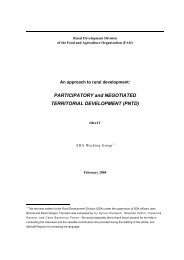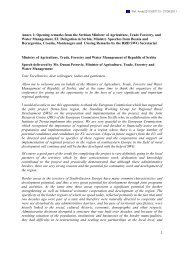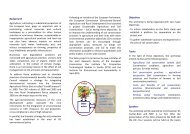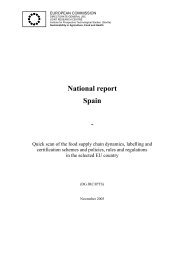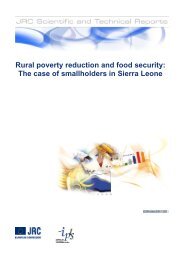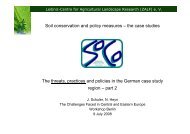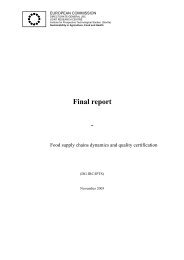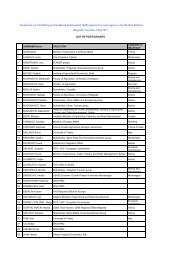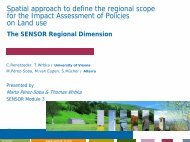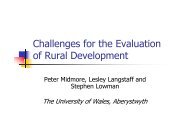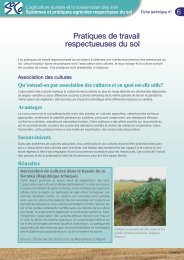SIERRA LEONE maq 4ª.indd - agrilife - Europa
SIERRA LEONE maq 4ª.indd - agrilife - Europa
SIERRA LEONE maq 4ª.indd - agrilife - Europa
You also want an ePaper? Increase the reach of your titles
YUMPU automatically turns print PDFs into web optimized ePapers that Google loves.
ing about increased fish supplies to the<br />
domestic and export market and contribute<br />
to poverty reduction.<br />
Improving rural services:<br />
• Extension services: create a demand-<br />
driven semiautonomous extension system<br />
to take over from the current dysfunctional<br />
government system. This will build on<br />
initiatives such as the present Farmer Field<br />
Schools, to involve a number of different<br />
stakeholders: the private sector, NGOs and<br />
research and training institutes.<br />
• Research system: restructure by bringing<br />
all research programmes under a unified<br />
management structure, the Sierra Leone<br />
Agricultural Research Institute, to develop<br />
and implement a National Collaborative<br />
Agricultural Research Programme. Research<br />
will be primarily adaptive, and respond to<br />
the needs expressed by farmers in the areas<br />
of crop production, livestock, fisheries,<br />
post-harvest technology, natural resource<br />
management and agricultural policy.<br />
• Rural finance: restructure so as to ensure access<br />
by farmers, both men and women, to provide<br />
credit for input use and seasonal credit. Credit<br />
will also be required for equipment purchase,<br />
and credit lines should be organised for<br />
farmer’s association and small-scale farmer<br />
groups, and to encourage the participation<br />
of other private sector investors in various<br />
aspects of the livestock industry. These service<br />
delivery programmes should be developed in<br />
collaboration with farmers.<br />
Rural Infrastructure:<br />
• Roads, this programme will be undertaken<br />
by central and district roads, transportation<br />
and works departments as part of an expected<br />
wider, national intervention to bring the country<br />
up to a recognizable international standard of<br />
provision. Maintenance of all but the major<br />
roads will be the responsibility of district<br />
councils, and it is necessary that suitable funds<br />
are made available for this purpose.<br />
• Irrigation and drainage works rehabilitation,<br />
and handling and storage facilities; it<br />
is recommended that these should be<br />
implemented through districts, chiefdoms and<br />
farmer groups, to be financed mainly by loans,<br />
with a significant beneficiary contribution.<br />
Towards the end of 2009, the GoSL<br />
published The National Sustainable Agriculture<br />
Development Plan (NSADP) which follows<br />
from the second generation PRSP, the Agenda<br />
for Change and the Vision of commercialising<br />
agriculture, forestry, fisheries and livestock<br />
through linking small to large farmers to market<br />
economies (NSADP, 2009). The Plan therefore not<br />
only reorganises precedent efforts and policies<br />
in the agricultural sector but sets four specific<br />
major sub-programmes that have the specific<br />
objective of increasing agriculture sector growth<br />
from 2% to 6% per annum by 2015. As with past<br />
documents, the NSADP is in line with the first<br />
Millennium Development Goal and World Food<br />
Summit targets (NSADP, 2009). The four subprogrammes<br />
include:<br />
• Commercialisation of key commodities<br />
including a small-holder commercialisation<br />
scheme and medium and large farm<br />
producer’s promotion scheme.<br />
• Agriculture infrastructure with focus on<br />
rehabilitation and upgrading of feeder<br />
roads, development of irrigable swamps,<br />
rehabilitation and modernisation of storage<br />
and processing facilities and rehabilitation<br />
and construction of research centres and<br />
MAFFS/MFMR facilities.<br />
• Private sector promotion which will focus<br />
on policies and legislation to encourage<br />
sustainable domestic and international<br />
investments in the agricultural and fisheries<br />
sector.<br />
Rural poverty reduction and food security: The case of smallholders in Sierra Leone<br />
55



